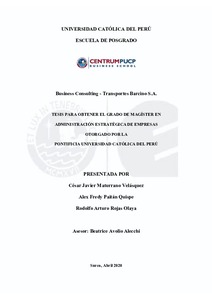| dc.contributor.advisor | Avolio Alecchi, Beatrice Elcira | |
| dc.contributor.author | Maturrano Velásquez, César Javier | |
| dc.contributor.author | Paitán Quispe, Alex Fredy | |
| dc.contributor.author | Rojas Olaya, Rodolfo Arturo | |
| dc.date.accessioned | 2020-08-12T23:41:07Z | |
| dc.date.available | 2020-08-12T23:41:07Z | |
| dc.date.created | 2020 | |
| dc.date.issued | 2020-08-12 | |
| dc.identifier.uri | http://hdl.handle.net/20.500.12404/16787 | |
| dc.description.abstract | Transportes Barcino S.A., es una empresa privada nacional que dio inicio a sus
operaciones en el año 1989 en la ciudad de Arequipa dentro del rubro de transporte, con el
objetivo de atender los requerimientos o necesidades de carga terrestre. Transportes Barcino
asume un rol importante para la operativa de la corporación Aceros Arequipa, siendo su
principal socio para el transporte de sus productos a nivel nacional e internacional, y el
reaprovisionamiento entre sus almacenes. El objetivo de la consultoría de negocios fue
identificar el principal problema que no le permite a Transportes Barcino alcanzar sus
objetivos en los últimos años, analizando las principales causas y proponiendo un plan de
acción a la organización para mitigarlo. Se encontró que el problema principal gira en los
altos costos del servicio, los cuales han venido representando aproximadamente un 92% de
los ingresos totales por el servicio de transporte y carga; siendo la gestión del consumo de
combustible parte del problema.
La meta actual de Transportes Barcino es reducir los costos generados por el servicio
de transporte, incrementar la facturación a través de nuevas rutas, existiendo el interés de
cubrir rutas en el norte del país.
Luego de una serie de reuniones de trabajo con la administración de Transportes
Barcino, se identificó entre las causas raíz de su problema la ausencia de controles y
monitoreo del uso de combustible. Con base en el análisis externo e interno y la literatura
investigada se propone una serie de planes de acción para que Transportes Barcino pueda
alcanzar los objetivos propuestos. Entre los principales se encuentran: el establecimiento de
un convenio con un proveedor, definición de puntos estratégicos de abastecimiento,
elaboración de un programa de capacitación, implementación de una política de evaluación, y
el establecimiento de indicadores y reportes para su correcto monitoreo para medir el éxito de
las acciones. | es_ES |
| dc.description.abstract | Transportes Barcino S.A. is a national private company that began operations in 1989
in the city of Arequipa within the transportation sector, with the aim of meeting the
requirements or needs of land cargo. Transportes Barcino plays an important role for Aceros
Arequipa corporation’s operations, being its main partner for the national and international
transportation of its products, and the replenishment between its warehouses. The objective of
the business consulting was to identify the main problem that has not allowed Transportes
Barcino to achieve its objectives in recent years by analyzing the main causes and proposing
an action plan to the organization to mitigate it. The main problem was found to revolve
around the high costs of the service, which have been representing approximately 92% of
total income from the transportation and cargo services; being the management of fuel
consumption is part of the problem.
The current goal of Transportes Barcino is to reduce the costs generated by the
transportation service, to increase billing through new routes, being the interest to cover
routes in the north of the country.
After a series of work meetings with Transportes Barcino’s administration, the
absence of controls and monitoring of fuel use was identified as one of the root causes of the
problem. Based on the external and internal analysis and literature research, a series of action
plans are proposed so that Transportes Barcino can achieve the proposed objectives. These
include: the establishment of an agreement with a supplier, the definition of strategic supply
points, the development of a training program, the implementation of an evaluation policy,
and the establishment of indicators and reports for their proper monitoring in order to
measure the success of the actions. | es_ES |
| dc.language.iso | spa | es_ES |
| dc.publisher | Pontificia Universidad Católica del Perú | es_ES |
| dc.rights | info:eu-repo/semantics/closedAccess | es_ES |
| dc.subject | Consultores de empresas | es_ES |
| dc.subject | Transporte terrestre | es_ES |
| dc.title | Business consulting - transportes Barcino S.A. | es_ES |
| dc.type | info:eu-repo/semantics/masterThesis | es_ES |
| thesis.degree.name | Maestro en Administración Estratégica de Empresas | es_ES |
| thesis.degree.level | Maestría | es_ES |
| thesis.degree.grantor | Pontificia Universidad Católica del Perú. CENTRUM | es_ES |
| thesis.degree.discipline | Administración Estratégica de Empresas | es_ES |
| renati.advisor.dni | 09297737 | |
| renati.advisor.orcid | https://orcid.org/0000-0002-1200-7651 | es_ES |
| renati.author.dni | 43327697 | |
| renati.author.dni | 40791862 | |
| renati.author.dni | 43807468 | |
| renati.discipline | 413307 | es_ES |
| renati.level | https://purl.org/pe-repo/renati/level#maestro | es_ES |
| renati.type | https://purl.org/pe-repo/renati/type#tesis | es_ES |
| dc.publisher.country | PE | es_ES |
| dc.subject.ocde | https://purl.org/pe-repo/ocde/ford#5.02.04 | es_ES |





